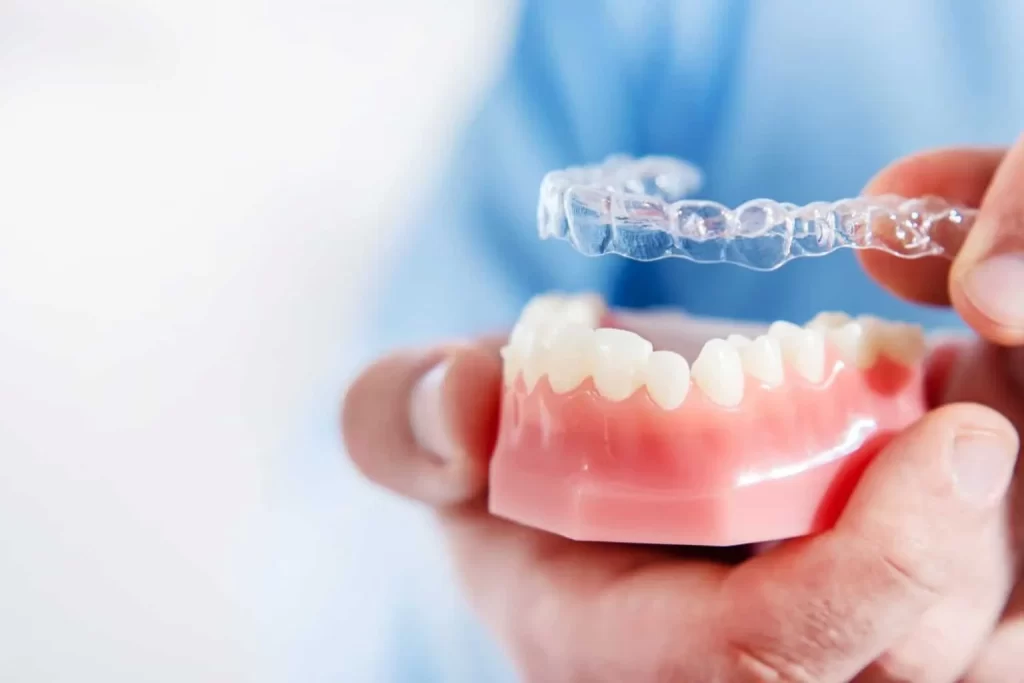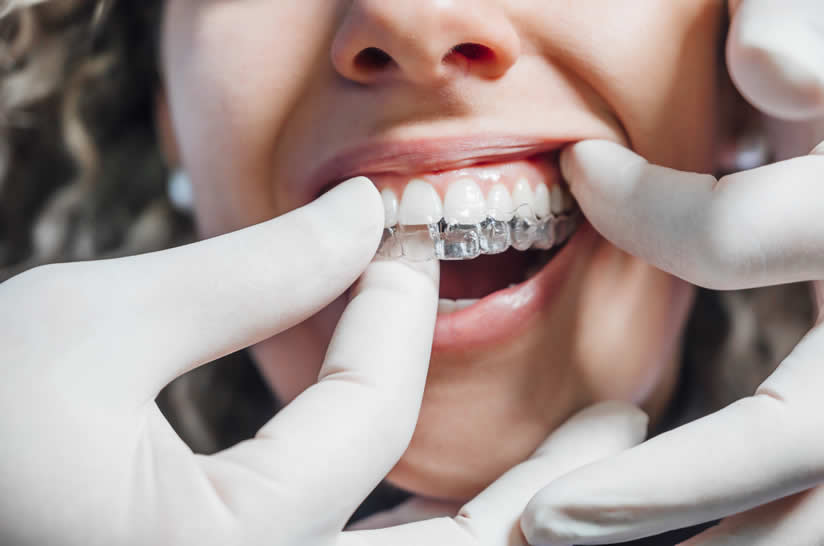Invisalign is a popular alternative to traditional braces, known for its transparent aligners that help straighten teeth discreetly. While most people are familiar with the clear trays used in Invisalign treatment, not everyone knows about the small but critical role Invisalign attachments play in achieving optimal results. These attachments work in conjunction with the aligners to provide the right amount of force and movement needed for effective teeth straightening. Here’s everything you need to know about Invisalign attachments, including their uses, procedure, care, and more.

What Are Invisalign Attachments?
Invisalign attachments are small, tooth-coloured bumps made from composite resin that adhere to specific teeth during treatment. The orthodontist strategically places these attachments to help guide the teeth into their desired position by allowing the aligners to grip the teeth more effectively. They come in various shapes and sizes, depending on the type of tooth movement required.
Attachments are not always necessary for all patients, but they are often recommended for more complex cases where certain teeth need extra force to move into the correct alignment. The number of attachments and their positioning will vary based on your customized Invisalign treatment plan.
Uses of Invisalign Attachments
Invisalign attachments are primarily used to enhance the effectiveness of the aligners. Here’s how they assist in the treatment:
Improved Grip and Control: The aligners fit snugly over the attachments, providing more traction and allowing the trays to apply the right amount of force in the desired direction. This is especially useful for moving teeth that require complex rotations or vertical adjustments.
Handling Complex Tooth Movements: Some teeth are more challenging to move due to their size, shape, or location. Attachments help to direct the aligners’ force more effectively, making it easier to address issues like rotated teeth, overbites, underbites, or deep bites.
Achieving Precise Results: By enhancing the aligners’ grip on the teeth, attachments contribute to the precision of the overall treatment. This ensures that each tooth moves according to the treatment plan, helping to achieve the desired alignment more efficiently.
Enhancing Treatment Speed: When attachments are used, teeth can respond to the treatment more quickly due to the improved control and force applied. This can potentially reduce the overall duration of the treatment.

The Procedure for Getting Invisalign Attachments
The process of getting Invisalign attachments is straightforward and usually takes about 20-30 minutes. Here’s what to expect:
Consultation and Treatment Planning: The orthodontist will first examine your teeth and create a digital treatment plan. If attachments are necessary, they will determine the exact number and placement of the attachments.
Preparation of the Teeth: Before attaching the bumps, the teeth are cleaned thoroughly to ensure the composite material adheres properly. A special solution may be applied to the teeth to prepare the enamel for the bonding process.
Placing the Attachments: The orthodontist will use a template aligner with slots for the attachments. The composite resin is applied to the designated teeth and hardened using a special curing light. Once the resin has hardened, the template aligner is removed, leaving the attachments securely in place.
Fitting the Aligners: After the attachments are in place, you’ll try on your Invisalign aligners to ensure a proper fit. The aligners should fit snugly over the attachments and help move your teeth according to the treatment plan.
Caring for Invisalign Attachments
While Invisalign attachments are relatively low maintenance, they do require some special care to ensure optimal results. Here are some tips to keep your attachments in good condition throughout your treatment:
Maintain Oral Hygiene: It’s important to brush and floss regularly to keep your teeth and attachments clean. Food particles and plaque can build up around the attachments, leading to staining and potentially causing decay. Use a soft-bristled toothbrush and fluoride toothpaste to clean your teeth at least twice a day.
Keep Your Aligners Clean: Clean your aligners daily by rinsing them under lukewarm water and brushing them gently with a soft toothbrush. This helps prevent bacteria buildup that could affect both your aligners and attachments.
Be Mindful of Staining: The composite resin used for attachments is tooth-coloured, but it can still stain over time if you consume a lot of dark-coloured foods and beverages such as coffee, tea, or red wine. Rinsing your mouth with water after consuming such items can help reduce the risk of staining.

Frequently Asked Questions About Invisalign Attachments
1. Will the attachments be noticeable?
Invisalign attachments are made from a tooth-coloured resin, which makes them less noticeable than traditional braces. However, since they do protrude slightly from the teeth, they may be visible at close range. Fortunately, their small size and colour make them blend in well with your natural teeth.
2. Are the attachments permanent?
No, the attachments are not permanent and will be removed once your treatment is complete. The removal process is painless and does not damage the tooth enamel. After the attachments are removed, your dentist will polish the teeth to restore their smooth surface.
3. What if an attachment falls off?
If an attachment falls off, contact your orthodontist as soon as possible. Missing attachments can hinder the effectiveness of the aligners, leading to delays in your treatment. Your orthodontist will replace the attachment to ensure your treatment stays on track.
4. Do attachments cause any discomfort?
While some patients may experience mild discomfort or pressure when the attachments are first placed, this typically subsides within a few days. The attachments themselves do not cause pain, but the pressure from the aligners may feel more intense initially due to the additional grip.

Why Choose Bangalore Orthodontics
If you’re considering Invisalign treatment, choosing Invisalign under the guidance of a seasoned expert like Dr. Divyashree Rajendra can make all the difference. Dr. Divyashree is one of the leading Invisalign providers in Bangalore, and she is known for her extensive international training and expertise in this innovative technology. With over 17 years of experience in orthodontics, Dr. Divyashree specializes in treating patients with braces and aligners. As a KOL Faculty for Align India, she provides training and mentorship to other orthodontists in clear aligner systems.
In addition, she has played a significant role in advancing the use of clear aligners in orthodontics as a Key Opinion Leader and Clinical Speaker for Invisalign India. At Bangalore Orthodontics, Dr. Divyashree Rajendra aims to create beautiful, confident, and healthy smiles that last a lifetime.
Contact Us today to determine the best course of treatment for your smile!

